Communication skills in agriculture play a pivotal role, directly impacting production and business efficiency. Mastering the art of communication helps farmers connect with stakeholders, from suppliers and partners to customers, opening up numerous opportunities for collaboration and sustainable development.
The Importance of Communication Skills in Agriculture
Effective communication is not just about exchanging information but also about building relationships, fostering trust, and promoting collaboration. In agriculture, this skill is even more critical as it directly impacts production efficiency, business success, and sustainable development.
- Enhancing Collaboration Efficiency: Good communication enables farmers to easily collaborate with stakeholders, from agricultural input suppliers to technical experts and business partners.
- Expanding Market Reach: Communication skills help farmers reach potential customers, introduce products, and build personal brands, thereby expanding their consumption market.
- Resolving Conflicts: Conflicts are inevitable in the workplace. Effective communication skills help resolve disputes efficiently, maintaining positive relationships with all parties involved.
- Accessing New Information and Technology: Through communication, farmers can access information about technical advancements and new technologies in agriculture, thereby improving productivity and product quality.
Essential Communication Skills in Agriculture
To succeed in agriculture, farmers need to cultivate various communication skills.
Active Listening Skills
Listening is not just hearing but also understanding and responding appropriately. Active listening helps farmers understand the needs of customers and partners and grasp information accurately.
Presentation Skills
Presentation skills are crucial for introducing products, sharing experiences, and persuading partners. Good presentation skills help farmers convey information clearly, coherently, and attractively.
Negotiation Skills
Negotiation skills are essential for reaching mutually beneficial agreements. In agriculture, negotiation helps farmers bargain prices, contract terms, and other related issues.
Non-Verbal Communication Skills
Non-verbal communication includes facial expressions, gestures, body language, and eye contact. Mastering these skills helps farmers create a good impression, demonstrate confidence, and professionalism.
Applying Communication Skills in Agricultural Techniques
Communication skills are not only important in business but also directly impact the application of agricultural techniques.
- Exchanging Information with Experts: Effective communication helps farmers exchange information with agricultural experts, learn about, and apply new techniques in production.
- Sharing Experiences: Through communication, farmers can share experiences and knowledge with each other, helping the agricultural community develop together.
- Training and Guiding: Good communication skills help farmers guide and train workers and employees to correctly apply techniques and production processes.
Conclusion
Communication skills in agriculture are a crucial factor determining success. Cultivating and developing these skills will help farmers enhance production efficiency, business success, and contribute to the sustainable development of the agricultural sector.
For support, please contact Phone Number: 0372666666, Email: [email protected] Or visit the address: 55 To Tien Thanh, Hanoi. We have a 24/7 customer care team.
